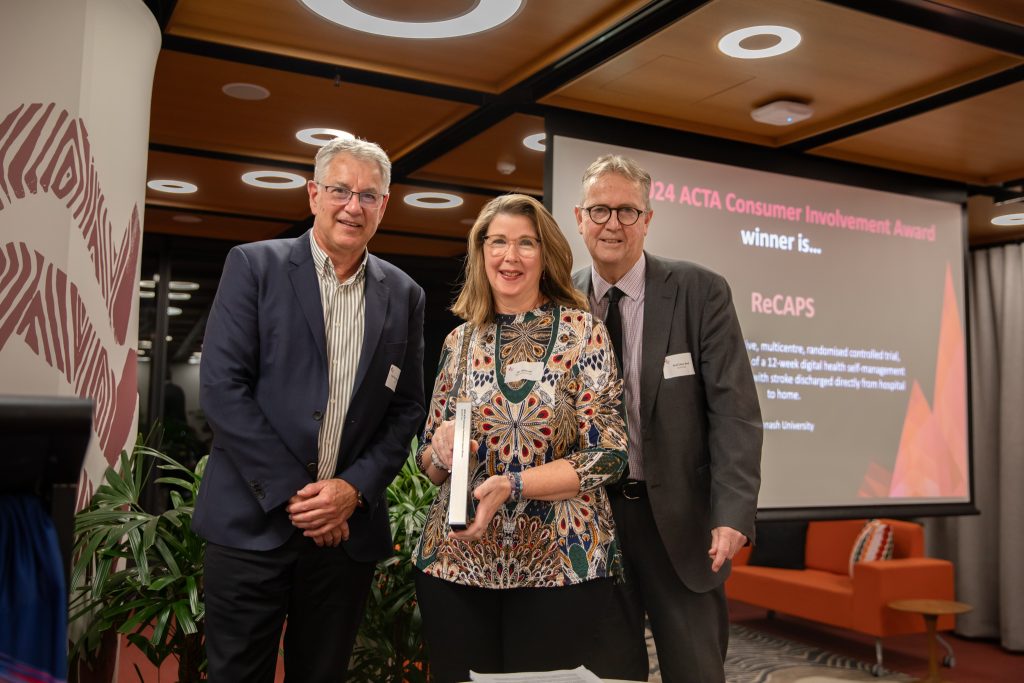The Australian clinical trials sector was celebrated at the 2024 ACTA Trial of the Year Awards ceremony, held on International Clinical Trials Day, Monday 20 May 2024.
Among an outstanding national selection of collaborative, multicenter, investigator-driven trials, four major awards were awarded.
ACTA Chair, Prof Chris Reid, shared that these awards serve to reinforce and celebrate the impact that innovative clinical trials have on healthcare delivery and patient care.
“Each year the nominations received are a testament to the extraordinary expertise, drive and imagination that exists in Australia for designing and conducting trials that change practice – both here and around the world”, said Prof Reid.
We were very pleased to be joined by The Hon Mark Butler MP, Minister for Health and Aged Care, Prof Steve Wesselingh, CEO NHMRC, and Dr Jean-Frederic Levesque, the Chief Executive of the NSW Agency for Clinical Innovation and Deputy Secretary, Clinical Innovation and Research of the NSW Ministry of Health.
The ACTA Trial of the Year Awards were established in 2016 to highlight the outstanding Australian achievements that advance clinical practice and save or improve the lives of patients every year.
Congratulations to our 2024 winners
ACTA Trial of the Year Award winner
ASAP (Australian Surgical Antibiotic Prophylaxis) Trial: Trial of Vancomycin and Cefazolin as Surgical Prophylaxis in Arthroplasty
The ASAP Trial explored if adding the antibiotic vancomycin to the current recommended antibiotic, cefazolin, would reduce or prevent post operative wound infections for people undergoing joint replacement surgery. 1 in 20 patients suffer a postoperative infection and one of the main ways to preventing these infections is to give an antibiotic at the time of surgery. This was a multicenter, double-blind, superiority, placebo-controlled trial and it found that the addition of vancomycin did not provide additional protection against infection.
Chief Investigator: Prof Trisha Peel
Network or investigator group: University of Queensland Centre for Clinical Research and Monash University

Runner-ups
Better Evidence for Selecting Transplant Fluids (BEST-Fluids)
This trial was an investigator-initiated, pragmatic, registry-based, multi-centre, double-blind, randomised controlled trial evaluating the effect of Plasmalyte versus 0.9% saline on early kidney transplant function in deceased donor kidney transplantation.
Lead Biostatistician: Elaine Pascoe
Chief Investigator: Dr Michael Collins and Prof Steven Chadban
Network or investigator group: Australasian Kidney Trials Network, University of Queensland
INTERACT3: The third INTEnsive care bundle with blood pressure Reduction in Acute Cerebral haemorrhage Trial
INTERACT3 used a novel, quality improvement, stepped wedge cluster randomised design involving over 7000 patients at 122 hospitals in 10 countries, to show that the early intervention of bundled care involving active care with protocols involving time- and target-based metrics, can substantially improve that chances of surviving free of disability after suffering an Intracerebral haemorrhage (ICH). INTERACT3 provides, for the first time, reliable evidence that ICH is a treatable condition
Chief Investigator: Prof Craig Anderson
Network or investigator group: The George Institute for Global Health
ACTA STInG Excellence in Trial Statistics Award winner
BRACE: BCG Vaccination to Reduce the impact of COVID-19 in hEalthcare workers
The BRACE trial was a significant global study that looked at whether the BCG vaccine, which is usually given to protect against tuberculosis, could also help protect healthcare workers from COVID-19. This was crucial given the urgent need for protective measures early in the pandemic before specific COVID-19 vaccines were available. The trial involved nearly 7,000 healthcare workers across 36 hospitals in five countries, making it one of the largest trials during the pandemic.
Lead Statistician: Ms Francesca Orsini
Chief Investigator: Prof Nigel Curtis
Network or investigator group: Murdoch Children’s Research Institute, in collaboration with Melbourne Children’s Trials Centre

Runner-up
Best Evidence for Selecting Transplant Fluids (BEST-Fluids)
Lead Biostatistician: Elaine Pascoe
Chief Investigator: Dr Michael Collins and Prof Steven Chadban
Network or investigator group: Australasian Kidney Trials Network, University of Queensland

ACTA HEAT Excellence in Trial Based Health Economics Award winner
The Melanoma Genomics Managing Your Risk Study
A randomised controlled trial of the efficacy of personal melanoma genomic risk of information, compared to standard prevention advice, in motivating reduced exposure to ultraviolet radiation in the general population.
Chief Investigator: A/Prof Stephen Law and Prof Rachael Morton
Network or investigator group: NHMRC Clinical Trials Centre, University of Sydney

ACTA Consumer Involvement Award winner
ReCAPS: The Recovery-focused Community support to Avoid readmissions and improve Participation after Stroke trial
This trial was a prospective, multicentre, randomised controlled trial, to assess the effectiveness of a 12-week digital health self-management support package for adults with stroke discharged directly from hospital to home.
Chief Investigator: Prof Dominique Cadilhac
Network or investigator group: Monash University


